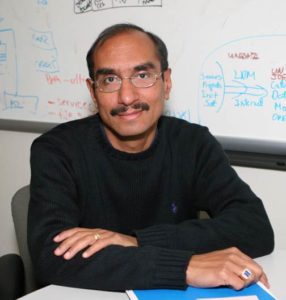Today’s Town Hall on Data Stewardship promises to be a good opportunity to consider how the atmospheric science community might reshape itself at the most fundamental level: the data underlying science and services.
According to Unidata’s Mohan Ramamurthy, chair of the AMS Ad Hoc

committee presenting its prospectus at the session (12:15 p.m.-1:15 p.m.; B211), data stewardship is not just a topic for people who specialize in archiving. Technology has made this a task for all of us. In the following email exchange, Ramamurthy made a good case to The Front Page for how data stewardship is basic to how the entire community interacts and progresses.
Why did AMS form an Ad Hoc Committee on Data Stewardship?
The AMS STAC Commissioner Roger Wakimoto was fielding a number of questions related to data, so in the fall of 2008 he began highlighting the importance of Data Stewardship. According to Roger’s report to the AMS Council in 2009
Our community is generating huge volumes of data from observing systems (especially remote sensors) and enormous outputs via numerical simulations. In addition, topics such as data archival, access (including free access between countries), maintenance, metadata, visualization, life expectancy are becoming critical at many institutions. In light of this background information, it was my suggestion that the AMS needed to propose a formal mechanism to recognize this important area that permeates our entire discipline.
How have stewardship needs changed in recent years?
Data has always been essential to the field. However, advances in computing, information and observational technologies have resulted in larger and larger volumes of diverse data being generated from many sources and they are being used/consumed by more and more people. What used to be the purview of just data centers and providers, has now become a responsibility for many more stakeholders. Also, there is increasing awareness of the importance of data and data stewardship. For example, the term “metadata” was not part of the scientific vernacular until recently, but now many more people understand it and recognize its importance. Similarly, until now there was no expectation that people would share datasets from their scientific studies or link them to publications with others. The best people did was give a URL where a reader of a scientific article could get a few additional plots or products. Today it is (theoretically) possible to link all of the data that went into a study (e.g., model output, model configuration, source code, derived analyses, etc.) in appropriate places in a paper. How to go about it? Who should be responsible for keeping those links and data sets alive in perpetuity?
How does AMS figure in this expansion of the possibilities, and responsibilities, of data stewardship?
We should understand that the AMS is not usually the producer of data sets. So the Society will have to work with data producers and data hosting/holding facilities. And how would AMS get authors to submit not just a manuscript but all of the data? And to where? Each area will have, among others, technical challenges, coordination and collaboration
challenges, and organizational challenges.
Also, data stewardship is a vast area, so we will have to scope it properly (i.e. limit it), or else nothing will get done. Picking those key areas will be a challenge when the membership is diverse and you have a large number of stakeholders.
What might attendees learn from the Town Hall in Atlanta?
The purpose of the Town Hall is two fold. a) To inform attendees about what the Ad Hoc committee is thinking and our proposed plans/activities. b) To gather feedback on our thoughts/plans/prospectus as well as get additional input on what AMS members would like to see happen in this area.
Who will most benefit from attending?
Almost anyone who is interested in data stewardship issues (scientists, data providers, editors and publication commission folks, librarians, educators, IT personnel) will benefit or can attend and contribute their thoughts. But realistically, I expect a smaller subset of those people who are most interested in this subject to come to the Town Hall.
Will feedback from attendees influence the committee’s task?
This is a brand new area for AMS. As such, everything is a work in progress. We want our mission and tasks to be shaped by the membership.